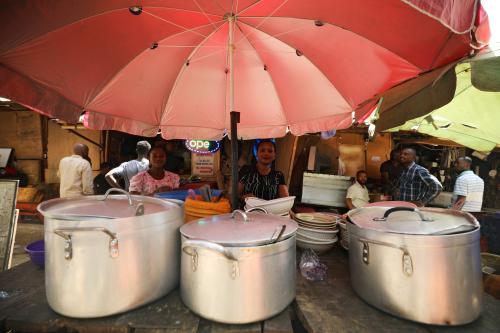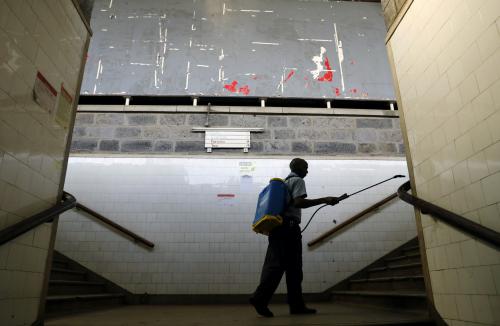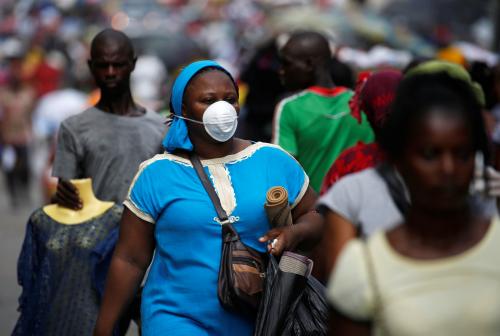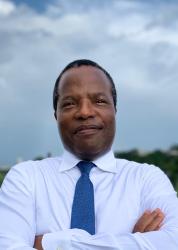When it comes to the COVID-19 pandemic, African countries’ unique challenges demand a regional response from an institution with the medical expertise to address its needs and leverage its strengths—the Africa Centers for Disease Control and Prevention (Africa CDC).
On April 2, 2020, the World Bank Group approved its largest-ever support facility in response to an emergency. The first group of projects through its dedicated, fast-track facility for COVID-19 response provided $1.9 billion for 25 countries, and new projects are being prepared for approval to support over 40 countries through the fast-track process. In the spirit of doing whatever it takes, the World Bank Group announced that it will deploy up to $160 billion over the next 15 months to support COVID-19 measures. The African Development Bank has also unveiled its $10 billion response facility to support governments and the private sector in Africa and successfully launched a $3 billion Fight COVID-19 social bond.
This deployment of resources by both multilateral development banks is commendable indeed. But will the objectives of the proposed interventions be achieved? The multilateral development banks follow a highly transactional, country-by-country approach to loans, credits, and grants. But at a time when coordinated action is vital, it makes more sense to also decisively support continental and regional institutions that have demonstrated success in tackling COVID-19.
One ray of hope has been the coming of age of the Africa CDC, nestled within the African Union and first established in 2017 in the aftermath of West Africa’s 2014-2016 Ebola outbreak that infected over 28,000 people, of whom 11,000 died. The outbreak highlighted the critical need for a continental entity for disease prevention, surveillance, and response. Africa’s heads of state and government rose to that challenge, a testament of their desire for a coordinated continental approach. Consistent with its mandate, Africa CDC has developed the enabling policies and guidelines for disease prevention and control, trained personnel, provided support during public health emergencies (e.g., Ebola in the Democratic Republic of the Congo, Lassa in Nigeria), and coordinated with donor agencies and philanthropic entities.
Faced with significant challenges from the COVID-19 pandemic, Africa CDC has conducted itself rather well in a number of ways.
- From the outset of the pandemic, Africa CDC developed a joint continental strategy on the coronavirus and launched a continental taskforce on COVID-19. It hosts regular virtual meetings and teleconferences of the coordinating committee—comprising the health ministers of all member states—on the continental response.
- Africa CDC has developed and broadly disseminates practical guidance, knowledge materials, and vital statistics on COVID-19. For example, it hosts a weekly webinar on how to diagnose, manage, and treat COVID-19 patients for the community of practice, which includes doctors and clinical providers. In addition, through training, it has greatly enhanced laboratory capacities and provided COVID-19 testing kits to labs in 48 African countries. In the past, these tests would have been sent to Paris or Atlanta with consequent delays. Africans would have also lost the opportunity for Africans to engage in the analyses and publications of research outcomes, which build the capacity of African researchers and health systems in the long run. Africa CDC has also served as the continental conduit for the receipt and expeditious distribution of medical equipment donated by Jack Ma and the Alibaba Foundation.
- Africa CDC and the African Union have launched the Africa COVID-19 Response Fund that aims to raise $150 million to prevent the disease’s transmission and a pool of about $400 million to support the procurement of medical supplies, deployment of rapid responders across the continent, and support to Africa’s most vulnerable populations.
- Even before the pandemic, Africa CDC and the World Health Organization (WHO) found a complementary—not competitive—common ground to work together to improve health security in Africa. This common ground is enshrined in a 2017 framework agreement for collaboration between the two entities. The Africa CDC director has also been designated as a WHO special envoy. This stated collaboration ensures the two institutions don’t duplicate efforts.
These are remarkable and promising accomplishments for a fledgling and grossly under-resourced institution. Despite these accomplishments, clearly, to build a capable institution with the massive mandate to cover 55 countries will take decades.
3 ways to empower Africa CDC going forward
First, Africa CDC needs the legal, institutional, and operational autonomy to effectively discharge its mandate, as it is currently subsumed within the African Union Commission. This independence will enable Africa CDC to, for instance, serve as a channel to mobilize financing to build the necessary capabilities and to acquire vital continental assets for disease prevention and control.
The second issue—and related to the above—is execution capacity. Going forward, Africa CDC must develop an independent capability for project management, including procurement, financial management, auditing, and social and environmental safeguards, in order to more effectively execute projects and programs. The World Bank Group believes in the Africa CDC and had approved a $10 million grant to Africa CDC before the pandemic. This amount seems quite small compared to the financing requirements to battle COVID-19. It also seems disproportionate relative to the approved support to individual countries, all of which need a coordinated continental approach for success. To be successful, Africa CDC needs more funding as well as capacity building in the areas in which the multilateral development banks are experts, namely project management and execution.
The third issue relates to the evident need to strengthen national health systems in Africa. The Africa CDC has already implemented training and capacity building throughout the continent as, ultimately, the institution’s continued effectiveness will depend on the caliber of public health assets and personnel there. Africa has already started off on the right foot with the African Union’s April 2001 Abuja Declaration requiring 15 percent of annual national budgets to be set aside for health financing. That target, however, proved unrealistic and many member states evidently failed to meet it. In the aftermath of COVID-19, policymakers need to set realistic targets to enable national health systems strengthening.
In the end, continued close collaboration at the continental, regional, and national levels is vital to protect the progress already made toward an integrated Africa. The steps needed to effectively prepare for a future outbreak are no longer in doubt, and support for an autonomous, capable Africa CDC from African governments and the multilateral development banks is essential for success. The measures indicated here will assure the continent’s preparedness to deal with this pandemic and future outbreaks.
The Brookings Institution is committed to quality, independence, and impact.
We are supported by a diverse array of funders. In line with our values and policies, each Brookings publication represents the sole views of its author(s).







Commentary
The coming of age of the Africa Centers for Disease Control
April 15, 2020